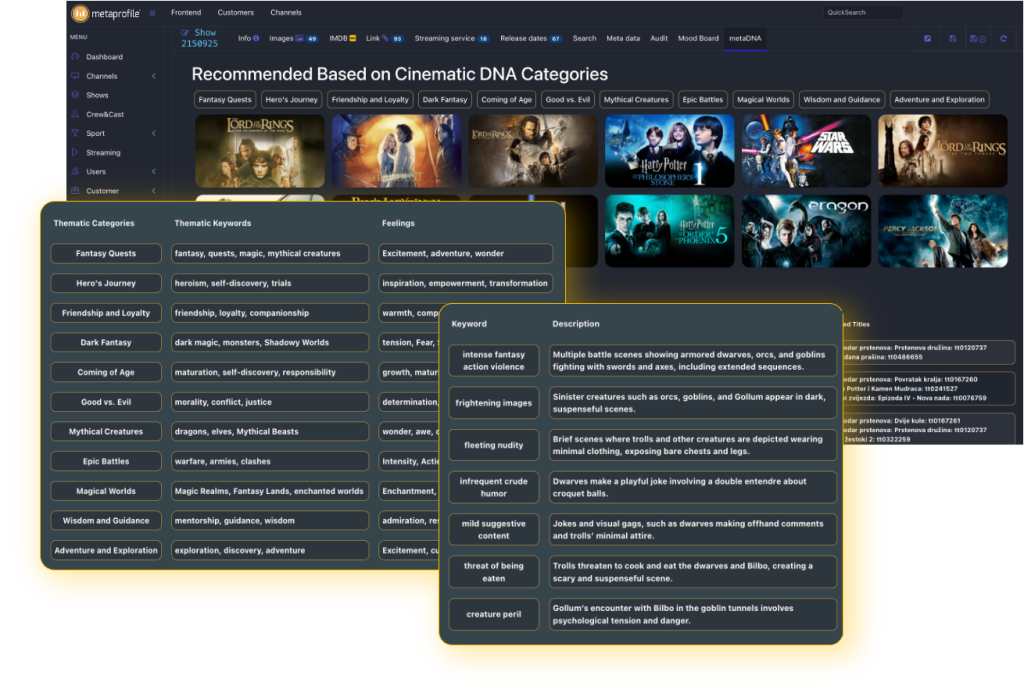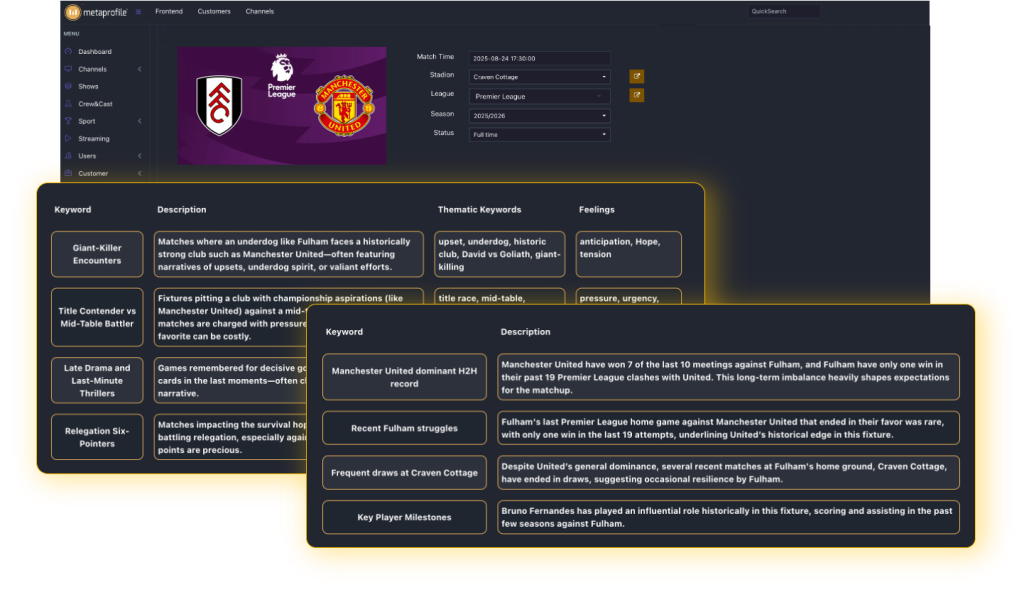Improving Content Discovery and CTV performance with AI driven metadata
Leveraging semantic AI-powered metadata, Metaprofile redefines how Entertainment, Sports, and CTV ecosystems discover, analyze, target, and monetize content.

For years, questions have remained about whether artificial intelligence can truly enhance content discovery, personalization, and CTV monetization. Skepticism has often focused on AI’s ability to grasp the subtleties of storytelling, sports narratives, and audience emotions, as well as its capacity to deliver accurate and consistent metadata. Today, Metaprofile’s metaDNA engine provides a clear answer: AI can fundamentally transform these areas. This breakthrough is made possible by Metaprofile’s extensive database of enriched and normalized schedules and TV content, combined with its innovative semantic metadata framework, demonstrating that with the right technology, these challenges can be effectively overcome.
Unlike traditional metadata pipelines that classify content through rigid or incomplete categories, the metaDNA engine structures data with meaning, integrating genres, plots, emotional depth, and cultural context. This innovation provides a new layer of relevance and precision for Entertainment, Sports, and CTV advertisers, reshaping how content is discovered, recommended, analized and monetized.
Properly prioritizing genres and subgenres
One of the largest industry frustrations is inconsistent or vague genre tagging, especially from fragmented sources. Metaprofile’s metaDNA engine harmonizes these inconsistencies by intelligently prioritizing genres and subgenres. For example, a film tagged simultaneously as “adventure, sci-fi, family, and action” can now be properly evaluated with contextual importance, ensuring discovery engines showcase it accurately whether audiences are searching for “family sci-fi” or “action-adventure.” This removes ambiguity and improves both search accuracy and recommendation reliability.
Improving content targeting with storyline keywords
AI-driven keywords extracted from storylines and script relevance enable improved audience targeting and recognition. Instead of relying on broad tags like “romance” or “football,” scene-linked keywords like “underdog comeback,” “political betrayal,” or “penalty shootout climax” allow platforms and advertisers to pinpoint the exact moments viewers connect with, increasing both viewer satisfaction and ad effectiveness.
Creating “Meaning-Rich” data with cinematic themes
Beyond genres, the future of personalization lies in thematic and narrative metadata. The metaDNA framework delivers storyline and relationship-based discovery. For example, connecting viewers who enjoy “redemption arc dramas” or “ensemble heist narratives.” By defining metadata through semantic units such as themes, plots, and character dynamics, recommendation engines go beyond surface labels, creating Netflix-quality personalization across all platforms.

Scene-relevant mood boards
With scene-level metadata, Metaprofile enables the creation of mood boards defined by emotions and visuals within specific moments. This capability allows entertainment platforms to highlight a thriller’s most suspenseful climaxes or a family film’s warmest reunions. For creative marketing campaigns, mood-based discovery playlists are now possible, curated toward tone, ambiance, and emotional resonance.
Privacy-friendly targeting and advanced parental guides
The metaDNA engine also enhances viewer safety and trust. Its scene-accurate parental warnings describe not only if content contains “violence” or “strong language” but also provide nuanced context such as “brief but graphic injury scene.” Advertisers and platforms can refine targeting without infringing on user privacy, while parents receive more detailed and actionable viewing guidance.
Sports recommendations with team-relevant themes
Sports fans don’t just follow fixtures, they follow team narratives. Using semantic analysis of historical matchups, rivalries, and tactical themes, metaDNA builds recommendations tied to audience emotions. A user may receive a prompt highlighting an upcoming game framed not only as “Team A vs Team B” but as “a classic rivalry renewed, with Team A chasing revenge after last season’s dramatic loss.”

Enriched sports context: Historical, Emotional, and Betting value
Sports content becomes more engaging when it is supported by historical statistics, emotional triggers, and contextual betting cues. With semantic enrichment, a highlight package of a football match can be tagged with metadata such as “historic penalty saves,” “title decider context,” or “record-breaking win streaks”, turning sports content into highly compelling, context-aware assets for fans, broadcasters, and betting platforms alike.
Richer match announcements with emotional hooks
Today’s sports promotion often sticks to schedules and lineups. metaDNA enables emotionally charged match previews by surfacing rivalries, milestone clashes, or players’ career-defining moments. Instead of announcing “Saturday, 8PM – FC Example vs City United,” platforms can say: “Saturday, 8PM – City United seek redemption after last season’s last-minute heartbreak.” This injects narrative drama that drives tune-in rates.
Rich, search-friendly TV channel metadata
For linear and FAST channels alike, metaDNA enriches channel descriptors with genre accuracy, target audience insights, editorial tone, and cultural positioning. A factual channel is not just labeled “Documentary” but can be enriched as “Factual / History, with an emphasis on modern conflicts and global perspectives targeted at educated adult audiences.” This boosts both discovery in EPG’s and search engine visibility.
Smarter monetization for CTV through scene-level analysis
In the CTV space, advertisers demand precision. With scene-level metadata intelligence, metaDNA allows campaigns to place ads against high-relevancy moments in content. A food delivery ad during a scene where characters share a family meal. A sports betting ad synced precisely to a penalty shootout moment. This granularity transforms monetization, ensuring both advertisers and viewers experience contextually optimized relevance, driving ROI without compromising the viewing journey.
Unlike competitors that depend on keyword tagging or limited post-broadcast signals, Metaprofile’s metaDNA engine applies a semantic model that understands not just what a title is about, but why it resonates with viewers. By embedding thematic, emotional, and narrative intelligence into metadata, we enable platforms to transform discovery, engagement, and ad performance. The result is a direct connection between stories and audiences, delivered with more precision, authenticity, and measurable business impact. ”
Let’s connect in Amsterdam and discuss AI driven metadata opportunities
our team of metadata experts would be delighted to meet with you and explore how we can support your current or upcoming metadata initiatives.

Admir Đozović, CEO Vladimir Kovačević, CTO Ivica Ćorluka, Global Head of TV Products & Services
- Posted by Admir
- On 26.08.2025

